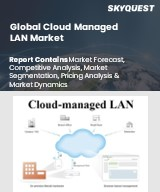
|
시장보고서
상품코드
1691792
네트워크 관리 솔루션 시장 - 산업규모, 점유율, 동향, 기회, 예측 : 컴포넌트별, 전개 모델별, 기업 규모별, 업계별, 지역별 부문 및 경쟁(2020-2030년)Network Management Solutions Market - Global Industry Size, Share, Trends, Opportunity, and Forecast Segmented By Component, By Deployment Model, By Enterprise Size, By Industry Vertical, By Region & Competition, 2020-2030F |
||||||
세계의 네트워크 관리 솔루션 시장 규모는 2024년 72억 1,000만 달러로, 2030년까지 CAGR 8.2%로 확대될 전망이며, 2030년에는 116억 7,000만 달러에 달할 것으로 예측되고 있습니다.
네트워크 관리 솔루션은 컴퓨터 네트워크 모니터링, 유지보수 및 최적화를 위한 종합적인 소프트웨어 및 하드웨어 도구를 말합니다. 네트워크와 같은 IT 인프라를 원활하게 운영하기 위해 기업과 조직에 필수적입니다.
| 시장 개요 | |
|---|---|
| 예측 기간 | 2026-2030년 |
| 시장 규모 : 2024년 | 72억 1,000만 달러 |
| 시장 규모 : 2030년 | 116억 7,000만 달러 |
| CAGR : 2025-2030년 | 8.2% |
| 급성장 부문 | 서비스 |
| 최대 시장 | 북미 |
네트워크 관리 솔루션 시장은 몇 가지 중요한 요인에 의해 큰 성장을 이루려고합니다. 클라우드 컴퓨팅, 가상화, 사물인터넷(IoT)과 같은 추세에 힘입어 현대 네트워크는 복잡성을 높이고 이러한 환경을 효율적으로 관리하고 보안을 보장하는 고급 도구가 필요합니다. 기업이 디지털 실적를 확장하고 온프레미스, 클라우드, 에지 컴퓨팅 리소스로 구성된 하이브리드 IT 인프라를 채택함에 따라 다양한 네트워크 아키텍처에 걸쳐 원활한 연결성, 신뢰성 및 성능을 보장하기 위한 견고한 네트워크 관리 솔루션에 대한 수요가 증가하고 있습니다.
원격 근무 증가나 COVID-19 팬데믹과 같은 세계의 이벤트에 대응한 IT 인프라의 분산화에 의해 클라우드 베이스나 SaaS(Software-as-a-Service)의 네트워크 관리 솔루션의 채용이 가속화되고 있습니다. 이러한 솔루션은 확장성, 유연성 및 접근성을 제공하므로 IT 팀이 어디서나 원격으로 네트워크를 모니터링하고 관리할 수 있습니다.
시장 성장 촉진요인
IT 인프라 복잡화
주요 시장 과제
통합 및 상호 운용성 문제
주요 시장 동향
인공지능과 머신러닝 채택
목차
제1장 개요
제2장 조사 방법
제3장 주요 요약
제4장 COVID-19가 세계 네트워크 관리 솔루션 시장에 미치는 영향
제5장 고객의 목소리
제6장 세계 네트워크 관리 솔루션 시장 개요
제7장 세계 네트워크 관리 솔루션 시장 전망
- 시장 규모와 예측
- 금액별
- 시장 점유율 및 예측
- 컴포넌트별(솔루션, 서비스)
- 전개 모델별(온프레미스, 클라우드)
- 기업 규모별(대기업, 중소기업)
- 업계별(은행, 금융서비스 및 보험(BFSI), IT 및 통신, 제조, 헬스케어, 정부, 소매, 운수 및 물류, 기타)
- 지역별
- 기업별(2024년)
- 시장 맵
제8장 북미의 네트워크 관리 솔루션 시장 전망
- 시장 규모와 예측
- 시장 점유율 및 예측
- 북미: 국가별 분석
- 미국
- 캐나다
- 멕시코
제9장 유럽의 네트워크 관리 솔루션 시장 전망
- 시장 규모와 예측
- 시장 점유율 및 예측
- 유럽: 국가별 분석
- 독일
- 프랑스
- 영국
- 이탈리아
- 스페인
- 네덜란드
- 벨기에
제10장 남미의 네트워크 관리 솔루션 시장 전망
- 시장 규모와 예측
- 시장 점유율 및 예측
- 남미 : 국가별 분석
- 브라질
- 콜롬비아
- 아르헨티나
- 칠레
제11장 중동 및 아프리카의 네트워크 관리 솔루션 시장 전망
- 시장 규모와 예측
- 시장 점유율 및 예측
- 중동 및 아프리카: 국가별 분석
- 사우디아라비아
- 아랍에미리트(UAE)
- 남아프리카
- 튀르키예
제12장 아시아태평양의 네트워크 관리 솔루션 시장 전망
- 시장 규모와 예측
- 시장 점유율 및 예측
- 아시아태평양: 국가별 분석
- 중국
- 인도
- 일본
- 한국
- 호주
- 태국
- 말레이시아
제13장 시장 역학
- 성장 촉진요인
- 과제
제14장 시장 동향과 발전
제15장 기업 프로파일
- Nokia Corporation
- NetScout Systems, Inc.
- Hewlett Packard Enterprise Company
- Broadcom, Inc
- BMC Software.
- Oracle Corporation.
- Cisco Systems Inc.
- IBM Corporation
- Huawei Technologies Co., Ltd.
- Juniper Networks, Inc
제16장 전략적 제안
제17장 기업 소개와 면책사항
JHS 25.04.21Global Network Management Solutions Market was valued at USD 7.21 billion in 2024 and is expected to reach USD 11.67 billion by 2030 with a CAGR of 8.2% through 2030. Network Management Solutions refer to comprehensive software and hardware tools designed to monitor, maintain, and optimize computer networks. These solutions are essential for businesses and organizations to ensure the smooth operation of their IT infrastructures, including local area networks (LANs), wide area networks (WANs), and wireless networks. Network Management Solutions typically encompass functionalities such as network monitoring, performance management, fault detection and troubleshooting, configuration management, and security management.
| Market Overview | |
|---|---|
| Forecast Period | 2026-2030 |
| Market Size 2024 | USD 7.21 Billion |
| Market Size 2030 | USD 11.67 Billion |
| CAGR 2025-2030 | 8.2% |
| Fastest Growing Segment | Services |
| Largest Market | North America |
The market for Network Management Solutions is poised for significant growth due to several key factors. The increasing complexity of modern networks, fueled by trends such as cloud computing, virtualization, and the Internet of Things (IoT), necessitates advanced tools to manage and secure these environments effectively. As organizations expand their digital footprints and adopt hybrid IT infrastructures comprising on-premises, cloud, and edge computing resources, the demand for robust network management solutions grows to ensure seamless connectivity, reliability, and performance across diverse network architectures.
The rise of remote work and the decentralization of IT infrastructure in response to global events like the COVID-19 pandemic have accelerated the adoption of cloud-based and software-as-a-service (SaaS) network management solutions. These solutions offer scalability, flexibility, and accessibility, allowing IT teams to monitor and manage networks remotely from anywhere, ensuring uninterrupted operations and support for distributed workforce environments.
Key Market Drivers
Increasing Complexity of IT Infrastructures
The growing complexity of IT infrastructures is a significant driver propelling the Network Management Solutions Market. As businesses embrace digital transformation, they are integrating diverse technologies such as cloud computing, virtualization, Internet of Things (IoT), and software-defined networking (SDN) into their operations. These technologies enhance agility, scalability, and efficiency but also introduce new complexities in managing and monitoring networks. Network Management Solutions address these challenges by providing comprehensive tools for monitoring network performance, detecting anomalies, optimizing traffic flow, and ensuring seamless connectivity across hybrid IT environments. With the proliferation of endpoints and data sources, IT teams require sophisticated solutions that can centrally manage and orchestrate network resources, ensuring reliability and responsiveness to meet business demands. As organizations continue to expand their digital footprints and adopt more complex IT architectures, the demand for robust Network Management Solutions capable of supporting diverse technologies and ensuring network stability will continue to grow. The number of connected devices globally is expected to exceed 75 billion by the end of 2025, increasing the complexity of network management due to the sheer volume and diversity of devices that must be monitored and maintained.
Key Market Challenges
Integration and Interoperability Challenges
One of the primary challenges facing the Network Management Solutions Market is integration and interoperability issues across diverse IT environments. As organizations adopt hybrid IT infrastructures comprising on-premises systems, cloud services, and IoT devices, ensuring seamless integration of network management solutions becomes increasingly complex. Each component of the IT ecosystem may operate on different protocols, use varied data formats, and require specific configurations, making it challenging to achieve comprehensive visibility and control through a unified management platform.
Integration challenges are exacerbated by the diversity of vendor solutions and technologies deployed within an organization. Network management tools from different vendors may lack interoperability standards, requiring extensive customization and integration efforts. This not only increases implementation costs but also prolongs deployment timelines, delaying the realization of operational efficiencies and return on investment. Moreover, legacy systems and outdated network infrastructure further complicate integration efforts, as these systems may lack support for modern protocols or APIs necessary for seamless interoperability with newer technologies.
Key Market Trends
Adoption of Artificial Intelligence and Machine Learning
The Network Management Solutions Market is witnessing a significant trend towards the adoption of Artificial Intelligence (AI) and Machine Learning (ML) technologies. AI and ML are revolutionizing network management by enabling predictive analytics, anomaly detection, and automated decision-making processes. These technologies empower network management solutions to analyze vast amounts of data in real-time, identify patterns, and predict network performance issues before they occur. For example, AI-driven algorithms can proactively detect network anomalies, optimize traffic routing, and allocate resources dynamically based on demand, thereby improving network efficiency and reliability. Machine learning models can also enhance security by identifying suspicious activities and potential threats, enabling faster incident response and mitigation. As AI and ML continue to evolve, their integration into network management solutions is expected to accelerate, driving innovation and transforming how organizations monitor, manage, and secure their network infrastructures. Broadcom announces the launch of a new enterprise-grade Bitnami offering and appoints Arrow Electronics as the global distributor for Bitnami Premium.
Key Market Players
- Nokia Corporation
- NetScout Systems, Inc
- Hewlett Packard Enterprise Company
- Broadcom, Inc
- Juniper Networks, Inc
- BMC Software
- Oracle Corporation
- Cisco Systems Inc.
- IBM Corporation
- Huawei Technologies Co., Ltd
Report Scope:
In this report, the Global Network Management Solutions Market has been segmented into the following categories, in addition to the industry trends which have also been detailed below:
Network Management Solutions Market, By Component:
- Solution
- Services
Network Management Solutions Market, By Enterprise Size:
- Large Enterprises
- SME
Network Management Solutions Market, By Deployment Model:
- On-premises
- Cloud
Network Management Solutions Market, By Industry Vertical:
- BFSI
- IT and Telecom
- Manufacturing
- Healthcare
- Government
- Retail
- Transportation and Logistics
- Others
Network Management Solutions Market, By Region:
- North America
- United States
- Canada
- Mexico
- Europe
- France
- United Kingdom
- Italy
- Germany
- Spain
- Netherlands
- Belgium
- Asia-Pacific
- China
- India
- Japan
- Australia
- South Korea
- Thailand
- Malaysia
- South America
- Brazil
- Argentina
- Colombia
- Chile
- Middle East & Africa
- South Africa
- Saudi Arabia
- UAE
- Turkey
Competitive Landscape
Company Profiles: Detailed analysis of the major companies present in the Global Network Management Solutions Market.
Available Customizations:
Global Network Management Solutions Market report with the given market data, TechSci Research offers customizations according toa company's specific needs. The following customization options are available for the report:
Company Information
- Detailed analysis and profiling of additional market players (up to five).
Table of Contents
1. Product Overview
- 1.1. Market Definition
- 1.2. Scope of the Market
- 1.2.1.Markets Covered
- 1.2.2.Years Considered for Study
- 1.2.3.Key Market Segmentations
2. Research Methodology
- 2.1. Objective of the Study
- 2.2. Baseline Methodology
- 2.3. Formulation of the Scope
- 2.4. Assumptions and Limitations
- 2.5. Sources of Research
- 2.5.1.Secondary Research
- 2.5.2.Primary Research
- 2.6. Approach for the Market Study
- 2.6.1.The Bottom-Up Approach
- 2.6.2.The Top-Down Approach
- 2.7. Methodology Followed for Calculation of Market Size & Market Shares
- 2.8. Forecasting Methodology
- 2.8.1.Data Triangulation & Validation
3. Executive Summary
4. Impact of COVID-19 on Global Network Management Solutions Market
5. Voice of Customer
6. Global Network Management Solutions Market Overview
7. Global Network Management Solutions Market Outlook
- 7.1. Market Size & Forecast
- 7.1.1.By Value
- 7.2. Market Share & Forecast
- 7.2.1.By Component (Solution, Services)
- 7.2.2.By Deployment Model (On-premise, Cloud)
- 7.2.3.By Enterprise Size (Large Enterprises, SMEs)
- 7.2.4.By Industry Vertical (BFSI, IT and Telecom, Manufacturing, Healthcare, Government, Retail, Transportation and Logistics, Others)
- 7.2.5.By Region
- 7.3. By Company (2024)
- 7.4. Market Map
8. North America Network Management Solutions Market Outlook
- 8.1. Market Size & Forecast
- 8.1.1.By Value
- 8.2. Market Share & Forecast
- 8.2.1.By Component
- 8.2.2.By Deployment Model
- 8.2.3.By Enterprise Size
- 8.2.4.By Industry Vertical
- 8.2.5.By Country
- 8.3. North America: Country Analysis
- 8.3.1.United States Network Management Solutions Market Outlook
- 8.3.1.1. Market Size & Forecast
- 8.3.1.1.1. By Value
- 8.3.1.2. Market Share & Forecast
- 8.3.1.2.1. By Component
- 8.3.1.2.2. By Deployment Model
- 8.3.1.2.3. By Enterprise Size
- 8.3.1.2.4. By Industry Vertical
- 8.3.1.1. Market Size & Forecast
- 8.3.2.Canada Network Management Solutions Market Outlook
- 8.3.2.1. Market Size & Forecast
- 8.3.2.1.1. By Value
- 8.3.2.2. Market Share & Forecast
- 8.3.2.2.1. By Component
- 8.3.2.2.2. By Deployment Model
- 8.3.2.2.3. By Enterprise Size
- 8.3.2.2.4. By Industry Vertical
- 8.3.2.1. Market Size & Forecast
- 8.3.3.Mexico Network Management Solutions Market Outlook
- 8.3.3.1. Market Size & Forecast
- 8.3.3.1.1. By Value
- 8.3.3.2. Market Share & Forecast
- 8.3.3.2.1. By Component
- 8.3.3.2.2. By Deployment Model
- 8.3.3.2.3. By Enterprise Size
- 8.3.3.2.4. By Industry Vertical
- 8.3.3.1. Market Size & Forecast
- 8.3.1.United States Network Management Solutions Market Outlook
9. Europe Network Management Solutions Market Outlook
- 9.1. Market Size & Forecast
- 9.1.1.By Value
- 9.2. Market Share & Forecast
- 9.2.1.By Component
- 9.2.2.By Deployment Model
- 9.2.3.By Enterprise Size
- 9.2.4.By Industry Vertical
- 9.2.5.By Country
- 9.3. Europe: Country Analysis
- 9.3.1.Germany Network Management Solutions Market Outlook
- 9.3.1.1. Market Size & Forecast
- 9.3.1.1.1. By Value
- 9.3.1.2. Market Share & Forecast
- 9.3.1.2.1. By Component
- 9.3.1.2.2. By Deployment Model
- 9.3.1.2.3. By Enterprise Size
- 9.3.1.2.4. By Industry Vertical
- 9.3.1.1. Market Size & Forecast
- 9.3.2.France Network Management Solutions Market Outlook
- 9.3.2.1. Market Size & Forecast
- 9.3.2.1.1. By Value
- 9.3.2.2. Market Share & Forecast
- 9.3.2.2.1. By Component
- 9.3.2.2.2. By Deployment Model
- 9.3.2.2.3. By Enterprise Size
- 9.3.2.2.4. By Industry Vertical
- 9.3.2.1. Market Size & Forecast
- 9.3.3.United Kingdom Network Management Solutions Market Outlook
- 9.3.3.1. Market Size & Forecast
- 9.3.3.1.1. By Value
- 9.3.3.2. Market Share & Forecast
- 9.3.3.2.1. By Component
- 9.3.3.2.2. By Deployment Model
- 9.3.3.2.3. By Enterprise Size
- 9.3.3.2.4. By Industry Vertical
- 9.3.3.1. Market Size & Forecast
- 9.3.4.Italy Network Management Solutions Market Outlook
- 9.3.4.1. Market Size & Forecast
- 9.3.4.1.1. By Value
- 9.3.4.2. Market Share & Forecast
- 9.3.4.2.1. By Component
- 9.3.4.2.2. By Deployment Model
- 9.3.4.2.3. By Enterprise Size
- 9.3.4.2.4. By Industry Vertical
- 9.3.4.1. Market Size & Forecast
- 9.3.5.Spain Network Management Solutions Market Outlook
- 9.3.5.1. Market Size & Forecast
- 9.3.5.1.1. By Value
- 9.3.5.2. Market Share & Forecast
- 9.3.5.2.1. By Component
- 9.3.5.2.2. By Deployment Model
- 9.3.5.2.3. By Enterprise Size
- 9.3.5.2.4. By Industry Vertical
- 9.3.5.1. Market Size & Forecast
- 9.3.6.Netherlands Network Management Solutions Market Outlook
- 9.3.6.1. Market Size & Forecast
- 9.3.6.1.1. By Value
- 9.3.6.2. Market Share & Forecast
- 9.3.6.2.1. By Component
- 9.3.6.2.2. By Deployment Model
- 9.3.6.2.3. By Enterprise Size
- 9.3.6.2.4. By Industry Vertical
- 9.3.6.1. Market Size & Forecast
- 9.3.7.Belgium Network Management Solutions Market Outlook
- 9.3.7.1. Market Size & Forecast
- 9.3.7.1.1. By Value
- 9.3.7.2. Market Share & Forecast
- 9.3.7.2.1. By Component
- 9.3.7.2.2. By Deployment Model
- 9.3.7.2.3. By Enterprise Size
- 9.3.7.2.4. By Industry Vertical
- 9.3.7.1. Market Size & Forecast
- 9.3.1.Germany Network Management Solutions Market Outlook
10. South America Network Management Solutions Market Outlook
- 10.1. Market Size & Forecast
- 10.1.1. By Value
- 10.2. Market Share & Forecast
- 10.2.1. By Component
- 10.2.2. By Deployment Model
- 10.2.3. By Enterprise Size
- 10.2.4. By Industry Vertical
- 10.2.5. By Country
- 10.3. South America: Country Analysis
- 10.3.1. Brazil Network Management Solutions Market Outlook
- 10.3.1.1. Market Size & Forecast
- 10.3.1.1.1. By Value
- 10.3.1.2. Market Share & Forecast
- 10.3.1.2.1. By Component
- 10.3.1.2.2. By Deployment Model
- 10.3.1.2.3. By Enterprise Size
- 10.3.1.2.4. By Industry Vertical
- 10.3.1.1. Market Size & Forecast
- 10.3.2. Colombia Network Management Solutions Market Outlook
- 10.3.2.1. Market Size & Forecast
- 10.3.2.1.1. By Value
- 10.3.2.2. Market Share & Forecast
- 10.3.2.2.1. By Component
- 10.3.2.2.2. By Deployment Model
- 10.3.2.2.3. By Enterprise Size
- 10.3.2.2.4. By Industry Vertical
- 10.3.2.1. Market Size & Forecast
- 10.3.3. Argentina Network Management Solutions Market Outlook
- 10.3.3.1. Market Size & Forecast
- 10.3.3.1.1. By Value
- 10.3.3.2. Market Share & Forecast
- 10.3.3.2.1. By Component
- 10.3.3.2.2. By Deployment Model
- 10.3.3.2.3. By Enterprise Size
- 10.3.3.2.4. By Industry Vertical
- 10.3.3.1. Market Size & Forecast
- 10.3.4. Chile Network Management Solutions Market Outlook
- 10.3.4.1. Market Size & Forecast
- 10.3.4.1.1. By Value
- 10.3.4.2. Market Share & Forecast
- 10.3.4.2.1. By Component
- 10.3.4.2.2. By Deployment Model
- 10.3.4.2.3. By Enterprise Size
- 10.3.4.2.4. By Industry Vertical
- 10.3.4.1. Market Size & Forecast
- 10.3.1. Brazil Network Management Solutions Market Outlook
11. Middle East & Africa Network Management Solutions Market Outlook
- 11.1. Market Size & Forecast
- 11.1.1. By Value
- 11.2. Market Share & Forecast
- 11.2.1. By Component
- 11.2.2. By Deployment Model
- 11.2.3. By Enterprise Size
- 11.2.4. By Industry Vertical
- 11.2.5. By Country
- 11.3. Middle East & Africa: Country Analysis
- 11.3.1. Saudi Arabia Network Management Solutions Market Outlook
- 11.3.1.1. Market Size & Forecast
- 11.3.1.1.1. By Value
- 11.3.1.2. Market Share & Forecast
- 11.3.1.2.1. By Component
- 11.3.1.2.2. By Deployment Model
- 11.3.1.2.3. By Enterprise Size
- 11.3.1.2.4. By Industry Vertical
- 11.3.1.1. Market Size & Forecast
- 11.3.2. UAE Network Management Solutions Market Outlook
- 11.3.2.1. Market Size & Forecast
- 11.3.2.1.1. By Value
- 11.3.2.2. Market Share & Forecast
- 11.3.2.2.1. By Component
- 11.3.2.2.2. By Deployment Model
- 11.3.2.2.3. By Enterprise Size
- 11.3.2.2.4. By Industry Vertical
- 11.3.2.1. Market Size & Forecast
- 11.3.3. South Africa Network Management Solutions Market Outlook
- 11.3.3.1. Market Size & Forecast
- 11.3.3.1.1. By Value
- 11.3.3.2. Market Share & Forecast
- 11.3.3.2.1. By Component
- 11.3.3.2.2. By Deployment Model
- 11.3.3.2.3. By Enterprise Size
- 11.3.3.2.4. By Industry Vertical
- 11.3.3.1. Market Size & Forecast
- 11.3.4. Turkey Network Management Solutions Market Outlook
- 11.3.4.1. Market Size & Forecast
- 11.3.4.1.1. By Value
- 11.3.4.2. Market Share & Forecast
- 11.3.4.2.1. By Component
- 11.3.4.2.2. By Deployment Model
- 11.3.4.2.3. By Enterprise Size
- 11.3.4.2.4. By Industry Vertical
- 11.3.4.1. Market Size & Forecast
- 11.3.1. Saudi Arabia Network Management Solutions Market Outlook
12. Asia Pacific Network Management Solutions Market Outlook
- 12.1. Market Size & Forecast
- 12.1.1. By Value
- 12.2. Market Share & Forecast
- 12.2.1. By Component
- 12.2.2. By Deployment Model
- 12.2.3. By Enterprise Size
- 12.2.4. By Industry Vertical
- 12.2.5. By Country
- 12.3. Asia-Pacific: Country Analysis
- 12.3.1. China Network Management Solutions Market Outlook
- 12.3.1.1. Market Size & Forecast
- 12.3.1.1.1. By Value
- 12.3.1.2. Market Share & Forecast
- 12.3.1.2.1. By Component
- 12.3.1.2.2. By Deployment Model
- 12.3.1.2.3. By Enterprise Size
- 12.3.1.2.4. By Industry Vertical
- 12.3.1.1. Market Size & Forecast
- 12.3.2. India Network Management Solutions Market Outlook
- 12.3.2.1. Market Size & Forecast
- 12.3.2.1.1. By Value
- 12.3.2.2. Market Share & Forecast
- 12.3.2.2.1. By Component
- 12.3.2.2.2. By Deployment Model
- 12.3.2.2.3. By Enterprise Size
- 12.3.2.2.4. By Industry Vertical
- 12.3.2.1. Market Size & Forecast
- 12.3.3. Japan Network Management Solutions Market Outlook
- 12.3.3.1. Market Size & Forecast
- 12.3.3.1.1. By Value
- 12.3.3.2. Market Share & Forecast
- 12.3.3.2.1. By Component
- 12.3.3.2.2. By Deployment Model
- 12.3.3.2.3. By Enterprise Size
- 12.3.3.2.4. By Industry Vertical
- 12.3.3.1. Market Size & Forecast
- 12.3.4. South Korea Network Management Solutions Market Outlook
- 12.3.4.1. Market Size & Forecast
- 12.3.4.1.1. By Value
- 12.3.4.2. Market Share & Forecast
- 12.3.4.2.1. By Component
- 12.3.4.2.2. By Deployment Model
- 12.3.4.2.3. By Enterprise Size
- 12.3.4.2.4. By Industry Vertical
- 12.3.4.1. Market Size & Forecast
- 12.3.5. Australia Network Management Solutions Market Outlook
- 12.3.5.1. Market Size & Forecast
- 12.3.5.1.1. By Value
- 12.3.5.2. Market Share & Forecast
- 12.3.5.2.1. By Component
- 12.3.5.2.2. By Deployment Model
- 12.3.5.2.3. By Enterprise Size
- 12.3.5.2.4. By Industry Vertical
- 12.3.5.1. Market Size & Forecast
- 12.3.6. Thailand Network Management Solutions Market Outlook
- 12.3.6.1. Market Size & Forecast
- 12.3.6.1.1. By Value
- 12.3.6.2. Market Share & Forecast
- 12.3.6.2.1. By Component
- 12.3.6.2.2. By Deployment Model
- 12.3.6.2.3. By Enterprise Size
- 12.3.6.2.4. By Industry Vertical
- 12.3.6.1. Market Size & Forecast
- 12.3.7. Malaysia Network Management Solutions Market Outlook
- 12.3.7.1. Market Size & Forecast
- 12.3.7.1.1. By Value
- 12.3.7.2. Market Share & Forecast
- 12.3.7.2.1. By Component
- 12.3.7.2.2. By Deployment Model
- 12.3.7.2.3. By Enterprise Size
- 12.3.7.2.4. By Industry Vertical
- 12.3.7.1. Market Size & Forecast
- 12.3.1. China Network Management Solutions Market Outlook
13. Market Dynamics
- 13.1. Drivers
- 13.2. Challenges
14. Market Trends and Developments
15. Company Profiles
- 15.1. Nokia Corporation
- 15.1.1. Business Overview
- 15.1.2. Key Revenue and Financials
- 15.1.3. Recent Developments
- 15.1.4. Key Personnel/Key Contact Person
- 15.1.5. Key Product/Services Offered
- 15.2. NetScout Systems, Inc.
- 15.2.1. Business Overview
- 15.2.2. Key Revenue and Financials
- 15.2.3. Recent Developments
- 15.2.4. Key Personnel/Key Contact Person
- 15.2.5. Key Product/Services Offered
- 15.3. Hewlett Packard Enterprise Company
- 15.3.1. Business Overview
- 15.3.2. Key Revenue and Financials
- 15.3.3. Recent Developments
- 15.3.4. Key Personnel/Key Contact Person
- 15.3.5. Key Product/Services Offered
- 15.4. Broadcom , Inc
- 15.4.1. Business Overview
- 15.4.2. Key Revenue and Financials
- 15.4.3. Recent Developments
- 15.4.4. Key Personnel/Key Contact Person
- 15.4.5. Key Product/Services Offered
- 15.5. BMC Software.
- 15.5.1. Business Overview
- 15.5.2. Key Revenue and Financials
- 15.5.3. Recent Developments
- 15.5.4. Key Personnel/Key Contact Person
- 15.5.5. Key Product/Services Offered
- 15.6. Oracle Corporation.
- 15.6.1. Business Overview
- 15.6.2. Key Revenue and Financials
- 15.6.3. Recent Developments
- 15.6.4. Key Personnel/Key Contact Person
- 15.6.5. Key Product/Services Offered
- 15.7. Cisco Systems Inc.
- 15.7.1. Business Overview
- 15.7.2. Key Revenue and Financials
- 15.7.3. Recent Developments
- 15.7.4. Key Personnel/Key Contact Person
- 15.7.5. Key Product/Services Offered
- 15.8. IBM Corporation
- 15.8.1. Business Overview
- 15.8.2. Key Revenue and Financials
- 15.8.3. Recent Developments
- 15.8.4. Key Personnel/Key Contact Person
- 15.8.5. Key Product/Services Offered
- 15.9. Huawei Technologies Co., Ltd.
- 15.9.1. Business Overview
- 15.9.2. Key Revenue and Financials
- 15.9.3. Recent Developments
- 15.9.4. Key Personnel/Key Contact Person
- 15.9.5. Key Product/Services Offered
- 15.10. Juniper Networks, Inc
- 15.10.1. Business Overview
- 15.10.2. Key Revenue and Financials
- 15.10.3. Recent Developments
- 15.10.4. Key Personnel/Key Contact Person
- 15.10.5. Key Product/Services Offered
16. Strategic Recommendations
17. About Us & Disclaimer
(주말 및 공휴일 제외)


















